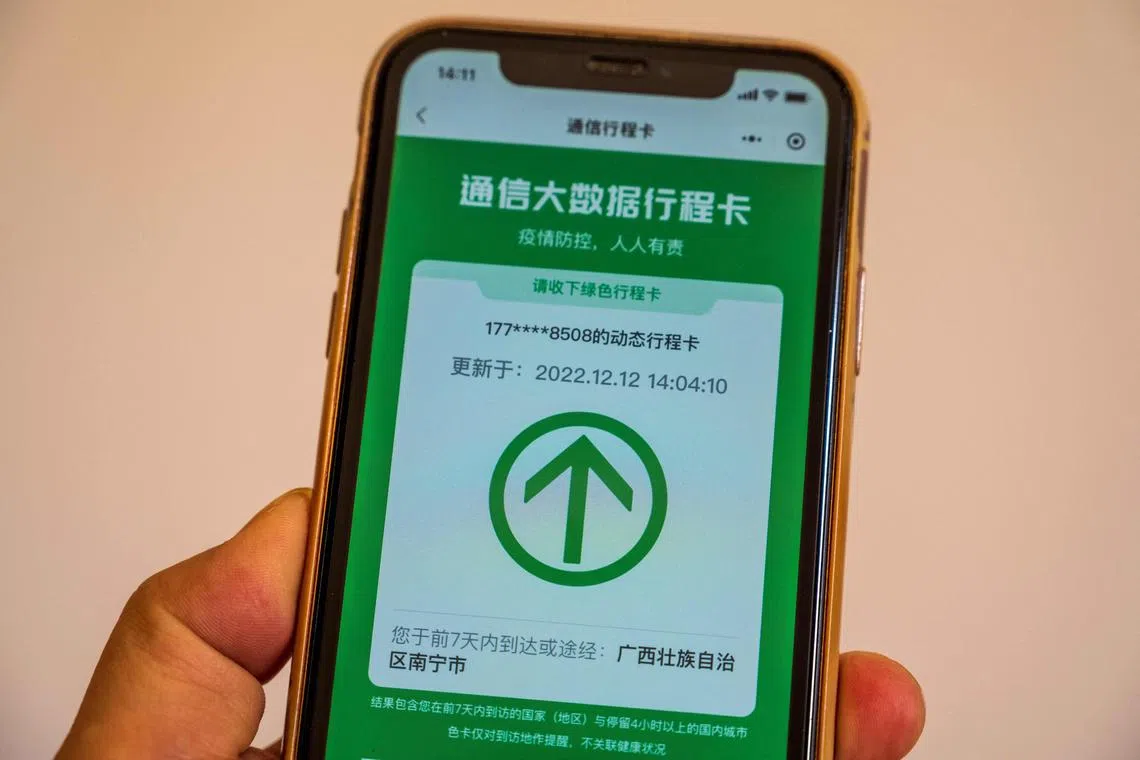China deletes Covid-19 tracking app as reopening gathers pace
Sign up now: Get insights on Asia's fast-moving developments

A mobile phone showing the now-scraped Itinerary Card app which is used to track travel to areas with Covid-19.
PHOTO: AFP
BEIJING – People in China celebrated the withdrawal on Tuesday of a state-mandated app used to track whether they had travelled to Covid-19-stricken areas, in the latest loosening of some of the world’s toughest anti-virus rules.
As the authorities deactivated the app at midnight on Monday, China’s four telecommunications companies said they would delete users’ data associated with the app.
“Goodbye itinerary code, I hope to never see you again,” said a post on social media platform Weibo, where netizens cheered the demise of an app that critics feared could be used for mass surveillance.
“The hand that stretched out to exert power during the epidemic should now be pulled back,” wrote another user.
For all the relief over last week’s decision to begin rowing back the government’s stringent zero-Covid policy, there are fears that China may now pay a price for having possibly protected its 1.4 billion people too well against the virus.
The potential for a surge of infections during the Chinese New Year holiday in January, when people travel across the country to be with their families, remains a danger for a population that lacks “herd immunity” and has relatively low vaccination rates among the elderly, according to some analysts.
Itinerary codes were mainly used to track domestic travel within China, while the authorities also use so-called health codes that residents must scan to enter public venues in order to check whether they may have been in contact with the virus.
The moves made last week to unwind the Covid-19 curbs include dropping mandatory testing for many public activities and reining in quarantine.
Long queues outside fever clinics were a worrying sign that a wave of infections is building, even though official tallies of new cases have trended lower in recent weeks as the authorities eased back on testing.
Healthcare company 111.inc said Pfizer’s oral Covid-19 treatment pill Paxlovid was sold out just over half an hour after the listing was reported in the media, in what appears to be the first retail sale of the drug in the country.
The sales page on the app showed on Tuesday that Paxlovid was retailing at 2,980 yuan (S$580) per box, underscoring surging demand for Covid-19 and flu medicines in China.
People can purchase the medication on the app if they submit a positive Covid-19 test result.
It was not clear how many boxes were sold and when sales would resume, or whether other retailers have also started selling the drug.
While the authorities have not announced that the health codes will be scrapped, several cities, including Shanghai, have said residents are no longer required to show these codes when entering places like shops and restaurants.
This loosening of controls, three years into the pandemic, comes after historic protests against economically damaging curbs that had been repeatedly championed by President Xi Jinping.
The demonstrations, which ranged from candlelit vigils in Beijing to street clashes between angry residents and riot police in Guangzhou, were the biggest show of public discontent in mainland China since Mr Xi came to power in 2012.
Beijing’s envoy to the United States, Mr Qin Gang, on Monday said he believes China’s Covid-19 measures will soon be further eased and international travel to the country will become easier.
“We know people’s concerns,” Mr Qin told a Semafor event on China-Africa relations. “Now, the measures are being relaxed and, in the near future, I believe that measures will be further relaxed and international travel will become easier.”
China has all but shut its borders to international travel since the virus first emerged in the central Chinese city of Wuhan in late 2019. International flights are still at a fraction of pre-pandemic levels, and arrivals face eight days in quarantine.
Border closures and repeated lockdowns in major cities to try to eradicate the virus have battered the world’s second-largest economy.
While the lifting of controls is seen as brightening the prospects for global growth in the longer term, analysts say Chinese business will struggle in the weeks ahead, as a wave of infections creates staff shortages and makes consumers wary.
Analysts say the decline in reported new cases could reflect the dropping of testing requirements rather than the actual situation on the ground.
“The rapid surge of infections in big cities might be only the beginning of a massive wave of Covid-19 infections,” said Nomura chief China economist Ting Lu. “We reckon that the incoming migration around the Chinese New Year holiday in late January could bring about an unprecedented spread of Covid-19.”
Experts say China’s fragile healthcare system could be quickly overwhelmed if those fears are realised.
In China’s capital Beijing, the line of people queueing outside a fever clinic at one hospital in the upmarket Chaoyang district stretched back 30m, according to a Reuters witness.
Empty seats on commuter trains and deserted restaurants in Beijing have underlined the hesitancy some people harbour about embracing new-found freedoms.
“Maybe other people are afraid or are worried about kids’and grandparents’ health conditions. It’s a personal choice,” financier Gao Lin, 33, told Reuters on a sidewalk in the capital.
China stocks edged lower on Tuesday as a recent rebound triggered by reopening hopes gave way to concerns about spreading infections. The renminbi currency was little changed, but it is already set for its worst year since 1994, when China unified the official and market exchange rates. REUTERS


